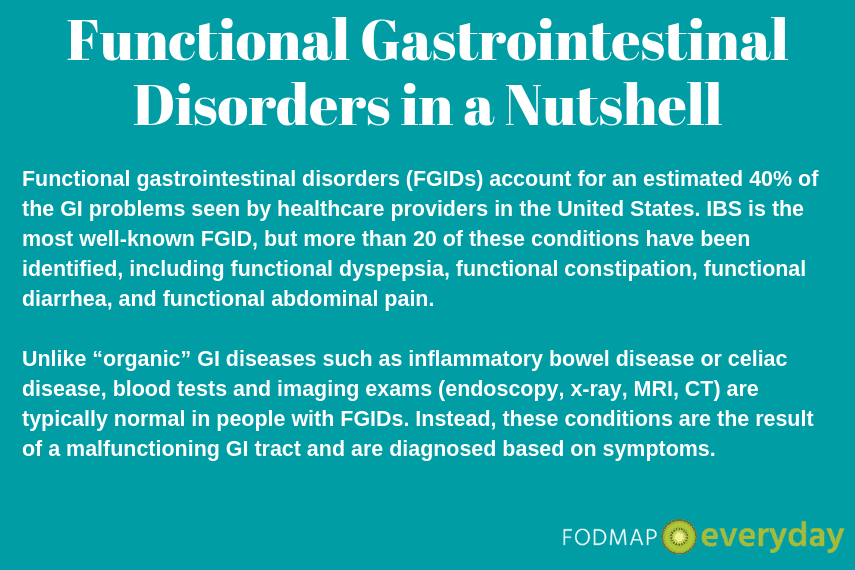Is It Time To Rename Functional Gastrointestinal Disorders?
This is the first of a two-part series about FODMAP Everyday Success Team Member Erica Ilton, RDN‘s experience at the annual meeting of the American College of Gastroenterology (ACG).
I was lucky enough to be invited to the annual ACG meeting this October, and while it meant getting up at 4:00 am to catch a train from New York City to Philly, it was well worth it. I wish I had time to go to all seven days, but the one day that I did attend was jam-packed with information about a wide range of gastrointestinal disorders.

Dr. Talley was generous with his time and knowledge, and he has the wonderful, dry wit I’ve come to expect from Aussies. He was even playful enough to challenge me to create a contest for FODMAP Everyday readers (more about that later)!
We’ve Come A Long Way – But Not There Yet
I wish I could tell you that Dr. Talley had found the answer to the question posed in the title of his talk, but I can’t.
At least not yet. Still, he made it clear that we’ve come a long way in our understanding of IBS and other functional gastrointestinal disorders (FGIDs). It was particularly satisfying to know that gastroenterologists in the audience who continue to ascribe classic FGID symptoms to “stress” were getting schooled big time!
 The Holy Grail
The Holy Grail
The potential causes of FGIDs include dysbiosis, gut infections, and dietary antigens, all of which were discussed by Dr. Talley. But what made his presentation stand out for me was his conviction that an overarching disease model is responsible for all FGIDs.
He likened this to the Holy Grail of physics — a Grand Unified Theory that explains and connects all the physical aspects of the universe.
Dr. Talley believes that the Holy Grail of FGIDs lies in an overactive immune system and that this is the mechanism that links all the other hypothetical causes together. He feels that it may even explain why people with FGIDs are more prone to various extra-gastrointestinal conditions such as anxiety and fibromyalgia.
Considering his research into the etiology of FGIDs, it should come as no surprise that Dr. Talley isn’t fond of the term “functional GI disorder.” He feels that it “connotes a difficult patient” rather than one with very real symptoms caused by something as yet not understood. I could not agree more.
He also said it would be more accurate to call FGIDs “unexplained gut disorders.” Here, I could not disagree more! Way too pessimistic, especially coming from Dr. Talley, who actually has a theoretical explanation for these conditions.
I am also aware that the Rome Foundation, the organization responsible for much of the scientific data about FGIDs, recently agreed upon a new definition: “disorders of brain-gut interaction.” But I find that even more vague than the original, and in any case, it doesn’t seem to be catching on.
Naming Contest for FODMAP Everyday® Readers
And this is where FODMAP Everyday® readers come in. When I mentioned to Dr. Talley that someone should create a contest to rename FGIDs, he said, “Why don’t you do it?”
Challenge accepted!
If you think you can come up with a better name for FGIDs than “unexplained gut disorders” or “disorders of brain-gut interaction,” we’d like to see it.
Submit Your Entry!
Please submit your entry in the comments section below this post and feel free to tell us why you think your name is a good one. Be creative, but be kind (no poop references, please!), and get your submission in no later than November 30, 2018. .
I can’t promise that the winning name will be adopted for common use, but I can promise that I’ll pass it on to Dr. Talley — a former Rome board member himself. We will pick the one we like the most and the winner will get a free phone consultation with me as well as a yummy, low FODMAP treat from the FODMAP Everyday Test Kitchen!
Get Creative!!
References
https://www.med.unc.edu/ibs/files/2017/10/What-Is-Functional-GI.pdf
 The Holy Grail
The Holy Grail







I think the new name could be
GastroPsicoInmunoNeurological Dissorders or GaPsIN Dissorders
Or GastroPsicoInmunoBrain Dissorders (GaPsInmunoBrain or GaPsIB Dissorders)
The razón Is because Is an interacción between the gut, our Brain, an overactive inmmune system AND the part Psicological, all we know, that the stress, our negattive thoughs change our Microbiom, hormons AND neurotransmisors, AND Is a trigger. I think Is an interaction between all systems.
Hi Carolina,
Thanks so much for your name idea!
Erica
Functional Gastrointestinal Stress Disorder FGSD
Referring to the functioning of the gastrointestinal tract and how stress, in its many forms, can cause various functional disorders of the gastrointestinal system.
(PTSD, trauma, and other types of stress are already linked to disorders of the gut.)
Hi Sandy,
A primary goal of this contest is to move away from using the word “functional” to describe disorders that researchers think have an organic basis. Dr. Talley, in particular, feels that an overactive immune system is the root cause of FGIDs.
Stress most certainly plays a role, but including it in the name may lead to FGIDs being dismissed as “all in your head,” which is how many people with these disorders were (unhelpfully) treated in the past.
Still, I really appreciate your submission and understand where you’re coming from!
Erica